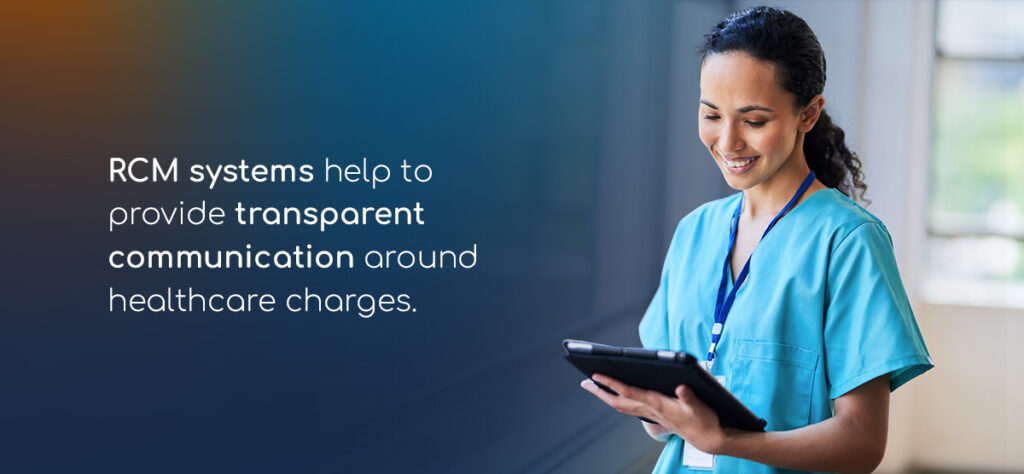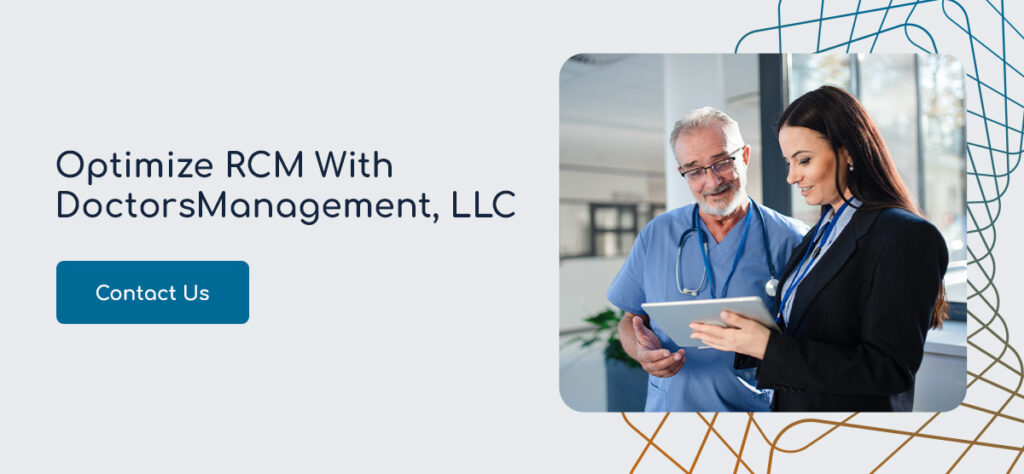Establishing a well-rounded revenue cycle management (RCM) system helps healthcare centers optimize their financial performance. However, navigating compliance regulations, patient insurance policies, and new technology can impact its successful implementation.
Why is RCM important? Our guide will provide a comprehensive explanation and uncover the benefits these systems offer practices. We’ll also delve into strategies to overcome potential obstacles to help teams optimize financial stability and patient care.
What Is RCM in Healthcare?
RCM in healthcare is the process that enables facilities to identify, manage, and collect revenue. It begins when a patient makes an appointment and concludes when the healthcare practice receives payment for their services.
One of the goals of RCM is to ensure accurate and timely reimbursement for healthcare services.
By billing patients correctly, healthcare practices can increase their overall customer satisfaction. Punctual payments also enable a constant cash flow, allowing facilities to better manage their expenses and profits.
Benefits of RCM in Healthcare
Implementing an efficient RCM system in a healthcare practice can be complex as there are several compliance regulations to navigate.
For example, facilities must adhere to the Health Insurance Portability and Accountability Act (HIPAA), which protects patient information. Integrating the RCM with existing technology and training staff can present a further challenge. However, the benefits make it well worth it. Here are five ways an RCM boosts a facility’s financial stability.
1. Reduced Claim Denials
Implementing effective revenue cycle optimization techniques can significantly enhance the medical billing process, resulting in fewer claim denials and improved overall cash flow. This ensures healthcare professionals can provide the necessary services and receive payment for their efforts.
In addition, clean claims help save valuable practice resources. A clean claim can be processed immediately, eliminating the need for the payer to provide any further information, which would cause the facility to reprocess the claim.
Staff can move on to other essential tasks by processing a claim the first time, ultimately increasing operational efficiency. Insurance providers also value dealing with reduced paperwork. Submitting a claim once also fosters better provider relationships and encourages smoother reimbursements.
2. Improved Staff Productivity
From registering a patient to handling post-treatment paperwork, healthcare staff at all levels must complete numerous administrative tasks. Research reveals that doctors in the U.S. spend twice as much time on paperwork as they do with their patients.
Healthcare providers can streamline revenue collection processes and improve staff productivity by optimizing the revenue cycle. A reduced administrative burden also ensures professionals can focus on higher-level tasks that improve patient care. Staff that can spend more working hours on completing stimulating work are also more likely to experience a sense of achievement at the end of their day, contributing to enhanced job satisfaction.
3. Enhanced Patient Satisfaction

Medical billing errors are a common phenomenon in U.S. healthcare practices, often resulting in patients paying some medical expenses out-of-pocket. As medical bills can become quite costly, this can cause undue stress for patients and their families.
RCM systems help to provide transparent communication around healthcare charges. By helping patients understand their financial responsibilities, they can make necessary plans and enjoy a more seamless experience.
In addition, RCM systems often lay out several payment plans, enabling patients to choose the best method to cover any additional fees according to their unique circumstances.
4. Better Compliance With Healthcare Regulations
Healthcare regulations are everchanging, resulting in practices needing to constantly review their compliance. Compliance programs also encompass several aspects, such as the following:
- Legal and regulatory compliance
- Patient safety and quality of care
- Billing and financial compliance
- Workforce training and management
- Ethical conduct
- Data protection and privacy
An RCM helps ensure healthcare providers adhere to industry regulations by standardizing key processes. Having a uniform method for coding, billing, and submitting claims helps minimize non-compliance mishaps. In addition, RCMs often encompass data security technology, enabling facilities to comply with HIPPA and maintain patient confidentiality. By ensuring up-to-date compliance, there is less risk of fines or penalties during audits.
5. Increased Profitability
An RCM provides a clear roadmap for processing billings and collections. Streamlining these operations prompts faster payments, which helps practices boost cash flow and remain in the black.
Similarly, RCMs can minimize debt. Since staff are more knowledgeable about outstanding claims, they are empowered to follow up with patients and remind them to settle their bills.
Revenue Cycle Management Consulting
Between treating patients and implementing strategies to scale healthcare businesses, it can be challenging to focus on optimizing RCM. Many practice owners overcome this hurdle by outsourcing this task to RCM consulting specialists. Here’s how the services they offer will help lay the foundation for revenue cycle optimization:
- RCM assessments and audits: Established practices likely already have an RCM in place — but does it ensure efficiency? Partnering with RCM experts helps teams identify gaps in their documents and implement processes to maximize revenue.
- Process improvement and optimization: RCM consultants are knowledgeable about the different revenue management models, enabling them to suggest the most relevant processes. Optimizing all aspects of RCM will result in fewer time-consuming administrative tasks.
- Technology implementation and integration: RCM experts can suggest the best technology for practices and assist in integrating the software into their operations. Practices that implement technology, such as electronic health record (EHR) systems, billing apps, and analytics tools, help to get the most value from their resources.
- Staff training and education: Implementing new systems often involves a transitional period. RCM consultants can provide the training staff must adapt to new technology.
- Denial management and appeals: As claim denials are a common reason behind revenue blockages, it’s best to uncover the reason behind these occurrences. Working with RCM experts lets practices gain insights into the reasons behind claim denials and possible corrective actions. Their data can also help identify patterns for increased clean claims in the future.
Whether your practice has been in operation for years or is just starting, there are several advantages to partnering with an experienced RCM consultant. You will have access to specialized expertise and the most current compliance regulations. This can result in improved efficiency and cost savings. They’ll also be able to customize solutions tailored to specific organizational needs.
Finally, working with an RCM expert provides an objective gaze on current processes. Taking a more qualitative approach can help teams find opportunities to increase revenue. In addition, removing the personal elements from the business can help reduce compliance risks.
Optimize RCM With DoctorsManagement, LLC
Changing healthcare regulations, complex insurance policies, and unskilled staff pose challenges to integrating a successful RCM. However, the advantages of streamlining all processes, from patient appointments to payment collections, are unrivaled.
DoctorsManagement, LLC specializes in assisting healthcare practices to overcome the challenges of RCM. Our consulting experts will also take the time to understand your center, allowing them to suggest strategies to revolutionize your processes.
Contact us today to learn how our RCM consulting services can help your practice achieve optimal revenue cycle optimization and enhance your medical billing process.

























